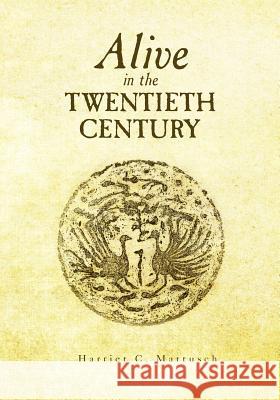Alive in the Twentieth Century » książka
Alive in the Twentieth Century
ISBN-13: 9781466409477 / Angielski / Miękka / 2012 / 600 str.
Harriet Mattusch's world stretches from South Dakota to New York to Germany, and on to Korea, India, Italy, France, Austria, and eastern Europe. Her life-story spans the twentieth century, and it is written in a conversational tone by a careful listener and an avid learner. She writes with wit, intellect, and the spirit of discovery. Born in South Dakota in 1913, Harriet studied modern dance in New York city, as well as theater, political science, and English literature. She was in Berlin in 1933, the year that Hitler came to power. Returning to the U.S., she got a job at Briarcliff College in New York. She married Kurt Robert Mattusch in 1942, who was born near Magdeburg and had been a founder of the German democratic youth movement, advising his groups in 1933 to leave Germany rather than join the Hitler Youth, and leaving himself in 1937. After the war, Harriet and Robert moved to Berlin, where he worked for the U.S. Civil Administration and she for Occupation Services. Returning to the U.S. in 1948, they renovated a house in Waterford before moving to a farm in Clifton, VA. They lived in Seoul, Korea, from 1959 to 1965, where Harriet wrote three books about Korea and its monuments. During the later 1960s and the 1970s, from their home-base in Clifton they traveled to India, Sri Lanka, and Nepal, to Eastern Europe and the Balkans; for a time they lived in France and in Austria. Harriet wrote about their experiences and about the people they met along the way. Harriet Cressey Mattusch's interests ranged from third-millennium-B.C. Korea to twentieth-century Berlin, from prehistoric man to Anthony Trollope, from classical archaeology to international politics. In addition to her fascination with current events, exploration, travel, archaeology, and dance, Harriet tracked human nature around the world and throughout the twentieth century. This book holds something of interest for anyone who was Alive in the Twentieth Century or who wonders what life could have been like in the twentieth century.
Zawartość książki może nie spełniać oczekiwań – reklamacje nie obejmują treści, która mogła nie być redakcyjnie ani merytorycznie opracowana.











